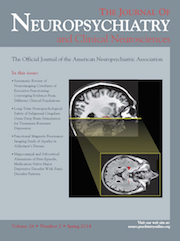To the Editor: Acute intermittent porphyria (AIP) is the most common among acute porphyrias (1 in 50,000 people, in Northern Europe 1–2 in 15,000 people). This is an autosomal dominant inheritance, which affects porphobilinogen deaminase producing hepatic accumulation and urinary-fecal presence of porphobilinogen and delta-aminolevulinic acid.
1 AIP usually appears after puberty with a large range of neuro-visceral and even psychiatric symptoms as the only manifestation.
2 This clinical picture can mimic many other disorders thereby delaying diagnosis and treatment. Psychosis in AIP generally consists of a recurrent crisis in which positive symptoms stop with antipsychotic treatment, and in some cases crisis are reported to be self-limited.
3The patient is a 19-year-old Spanish woman. She initially presented from home when during a party she told her mother that she believed that the beverages were being poisoned by the guests. She also expressed that she was having thoughts that the broadcasters on television were speaking about her. Her family made the choice to bring her to the hospital, and she was admitted to the inpatient psychiatric unit.
Her past medical history is significant for attention deficit hyperactivity disorder with frequent behavioral outbursts. She also had a significant drug abuse history. She used cannabis, alcohol, tobacco, and cocaine occasionally. In the month prior to this admission, the patient had drunk approximately 1 liter of beer and two “joints” of marijuana daily.
While in the hospital, the patient was initially prescribed 10 mg of olanzapine daily, however, she experienced cramping in her right arm and, therefore, the medication was discontinued and aripiprazole was started. However, the patient experienced akathisia, and this medication was also discontinued. At this time, the parents reported that they had noticed that her urine was darker than usual. They did not believe this was a result of her menstruation as the patient was receiving subcutaneous contraceptive treatment and had not had her menstrual cycle in 6 months. Also at this time, the patient was complaining of abdominal cramps and constipation. The parents reported that this was a frequent complaint as Ms. P was tried on different medications in the past, which included risperidone and carbamazepine.
When both the patient’s psychiatric and somatic complaints were taken into consideration, a diagnostic work up of AIP was started.
4 Hematological studies and head tomography were found to be within normal limits. Porphobilinogen levels in the urine were not high enough for diagnosis. There was no genetic laboratory available within our institution and, therefore, the diagnosis was not certain. As the patient remained psychotic with severely disorganized behavior, she continued to be treated with clozapine until symptoms were in remission.
At time of discharge, the patient was referred to the reference laboratory for genetic testing. There a decrease in porphobilinogen deaminase activity in erythrocytes concomitantly with the detection of IVS7 (+33) G>T mutation was found, confirming our suspicion of AIP.
5 In the patient’s follow-up appointments, clozapine was progressively decreased until discontinuation. Since then, she remains asymptomatic.

